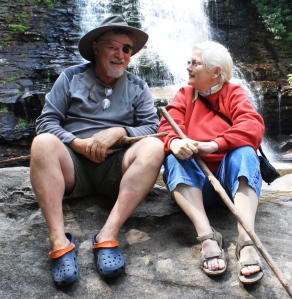 My Dad started dating pretty quickly after my Mom died. It shocked some. It shocked me.
My Dad started dating pretty quickly after my Mom died. It shocked some. It shocked me.Friends and family worried about how my sisters and I would react or feel. Some were angry with my father. They wondered how he could move on so quickly after my mother's death. Didn't he love her? Shouldn't he mourn her longer?
Surprisingly, my sisters and I were the most comfortable with the idea. I can't speak for them and their feelings but for me, it was a sign that my father did indeed love my mother deeply and he missed her terribly. It was a sign that he wanted to try to find the comfort and love that he had experienced during their marriage. Being with another was not a sign of disrespect for her but instead just the opposite. It was a visible declaration that he wanted to do what he could to find love again.
Let me be clear.... it still was not easy. I worked hard on not imagining what happened during more intimate moments with his dates. I sometimes had to look away when I saw him place a familiar arm around a woman's waist or hold her hand. But seeing him experience the hug and touch of another woman was also comforting -- I was glad to see him smile and feel happy again. Quite the mix of emotions!
Bottom line though was that I wanted my father to be happy. He had been a loving and faithful husband down to the last minute of their marriage and I and everyone else had to realize that he was no longer married. We may not like the circumstances that made him a single man but that is what he was. I wasn't the one having to go home to an empty house with all the memories of my mother around. I wasn't the one sitting in church alone, in the pew he had sat with my mother for many years. I wasn't the one eating dinner alone with only the cat for conversation. Who was I to tell him that he had to do a certain period of grieving before he could find happiness again?
What worked for me may not work for your and your family but here are some pointers that may help:
Understand that its not your life: You may not like your parent dating again but its not your life. They are the one dealing with being alone and they have to make choices for themselves on what will make their life better. Its their grieving process and each person deals with grief in a very personal and individual way.
The alternative could be worse: As much as you may hate your parent dating, the alternative could be a depressed parent who withdraws from the world. Many surviving parents never get over their spouse "leaving" them and just bide their time until their death. I want my father to be happy. I don't want him pining for a life with a woman who can no longer be with us.
Older people date different than younger people: We have time. They don't. They have been recently reminded in a very stark way that life doesn't last forever and they need to seize the day. While not all parents jump quickly into the dating pool, its not uncommon.
Stand up for them: Not everyone will be as understanding of your parent dating. You set the tone for everyone else. Its up to you to show everyone else how they should react. Although it may look easy, it can't be simple for your parent to begin dating someone else with the memories and potential guilt so if you can remove the judging of others that's one less thing they have to worry about. I know it was difficult for some of my mother's siblings to know my father was dating and while it didn't make it "okay" in their eyes just because I said so, it did make it easier for them to accept when I said it was okay with me.
Be Honest: If it bothers you that your parent is dating its probably okay to express it them as long as you also let them know that while it bothers you, you realize its still their life to lead. Be specific on how they might help you -- maybe it bothers you the most when you see them standing in a place that was special to your parents -- let them know and maybe they can avoid that spot. Be reasonable though. Its not okay to tell them they can't date at all or that they can't be near you. Some of this you just have to suck up and deal.
Moving on with our lives after a parent dies is not easy. This is just one more hurdle to cross and while it sounds cliché, it does get easier with time.




